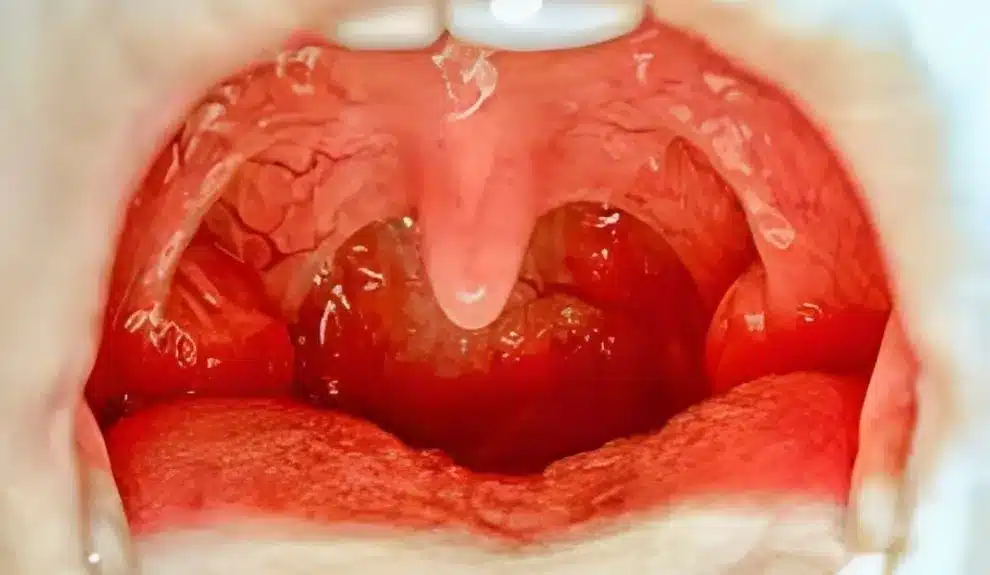Can Tonsils Grow Back After Being Removed? – tymoff is a question that often arises among individuals considering or recovering from a tonsillectomy, a surgical procedure aimed at removing the tonsils. While misconceptions about the potential regrowth of tonsils post-surgery persist, this article aims to provide clarity on the scientific facts and myths surrounding this topic. By exploring the outcomes and considerations associated with tonsillectomy, we can better understand the implications of this procedure and its long-term effects.
Understanding Tonsillectomy:
Tonsils are small masses of tissue located at the back of the throat and are part of the body’s immune system. Tonsillectomy involves the complete removal of these tonsils, typically performed under general anesthesia. The procedure is commonly recommended for individuals who experience recurrent tonsillitis, obstructive sleep apnea due to enlarged tonsils, or other complications associated with the tonsils. This sets the context for addressing the question “Can Tonsils Grow Back After Being Removed? – tymoff” by providing background information on what tonsils are and why tonsillectomy is performed.
Dispelling the Myth of Tonsil Regrowth:
Contrary to popular belief, tonsils do not regrow after they have been surgically removed in a standard tonsillectomy procedure. Once the tonsils are excised, including the tissue that can potentially regenerate, they do not reappear. However, there are rare instances where residual tonsillar tissue or tonsillar remnants may be left behind inadvertently during surgery. These remnants are often asymptomatic and do not require additional intervention. This dispels the misconception surrounding the question “Can Tonsils Grow Back After Being Removed? – tymoff” and provides clarity on the outcomes of tonsillectomy procedures.
Factors Influencing Tonsil Regrowth Perception:
Several factors may contribute to the perception of tonsil regrowth or the presence of residual tonsillar tissue after tonsillectomy. Incomplete removal of the tonsils during surgery, particularly in cases of complex tonsillar anatomy or extensive tissue, may result in residual tonsillar tissue. Additionally, the healing process following tonsillectomy may involve the formation of scar tissue, which can be mistaken for regrowth in some cases. This clarifies the question “Can Tonsils Grow Back After Being Removed? – tymoff” by addressing the potential reasons behind the misconception and providing insight into the postoperative healing process.
Clinical Evaluation and Management:
Patients experiencing symptoms suggestive of tonsil regrowth or persistent tonsillar issues after tonsillectomy should undergo a thorough clinical evaluation by a qualified healthcare professional. This evaluation may include a detailed medical history, physical examination, and diagnostic tests such as imaging studies or throat cultures. Based on the findings, appropriate management strategies can be recommended, ranging from conservative measures to surgical intervention if necessary. Addressing the question “Can Tonsils Grow Back After Being Removed? – tymoff” in this context emphasizes the importance of seeking medical evaluation and guidance for any concerns related to tonsillectomy outcomes.

Patient Education and Expectations:
Preoperative counseling plays a crucial role in educating patients undergoing tonsillectomy about the procedure, potential outcomes, and postoperative expectations. Patients should be informed about the rarity of tonsil regrowth and the importance of seeking medical attention if they experience persistent symptoms or concerns following surgery. Clear communication and realistic expectations are essential to ensuring optimal patient satisfaction and outcomes. Addressing the question “Can Tonsils Grow Back After Being Removed? – tymoff” in this context highlights the significance of preoperative education in dispelling misconceptions and promoting informed decision-making for patients undergoing tonsillectomy.
Addressing Common Misconceptions:
Misconceptions surrounding tonsil regrowth after tonsillectomy often stem from anecdotal accounts or incomplete understanding of the surgical procedure. Healthcare providers play a key role in debunking these myths and providing evidence-based information to patients. By addressing common misconceptions and clarifying misconceptions, healthcare providers can empower patients to make informed decisions about their healthcare. Addressing the question “Can Tonsils Grow Back After Being Removed? – tymoff” in this context emphasizes the importance of healthcare providers in educating patients and dispelling myths surrounding tonsillectomy outcomes.
The Significance of Tonsils in the Immune System
Can Tonsils Grow Back After Being Removed? – tymoff Tonsils play a crucial role in the body’s immune response by trapping and preventing the entry of bacteria and viruses through the mouth and nose. They contain specialized immune cells that help fight infections and protect the body from harmful pathogens.
Tonsillectomy Procedure and Recovery
Can Tonsils Grow Back After Being Removed? – tymoff Tonsillectomy is typically performed as a same-day surgical procedure under general anesthesia. During the procedure, the tonsils are removed using specialized surgical instruments, and any bleeding is controlled. Patients are usually discharged home on the same day with instructions for postoperative care and pain management.
Potential Complications of Tonsillectomy
Can Tonsils Grow Back After Being Removed? – tymoff While tonsillectomy is generally considered safe, there are potential risks and complications associated with the procedure. These may include bleeding during or after surgery, infection, adverse reactions to anesthesia, and changes in voice or speech. It is essential for patients to be aware of these risks and discuss them with their healthcare provider before undergoing tonsillectomy.
Alternatives to Tonsillectomy
In some cases, alternative treatments may be considered for managing tonsil-related issues. These may include antibiotics for treating recurrent tonsillitis, continuous positive airway pressure (CPAP) therapy for obstructive sleep apnea, or lifestyle modifications to reduce symptoms. However, the decision to pursue alternative treatments should be made in consultation with a healthcare professional based on individual circumstances. Addressing the question “Can Tonsils Grow Back After Being Removed? – tymoff” within this discussion highlights the importance of exploring various treatment options under medical guidance to address tonsil-related concerns effectively.
Research and Advances in Tonsillectomy
Ongoing research and advancements in medical technology continue to improve the safety and efficacy of tonsillectomy procedures. Minimally invasive techniques, such as coblation tonsillectomy and laser-assisted tonsillectomy, offer potential benefits such as reduced postoperative pain and faster recovery times. Healthcare providers stay updated on the latest evidence-based practices to provide optimal care for patients undergoing tonsillectomy. Addressing the question “Can Tonsils Grow Back After Being Removed? – tymoff” within this context underscores the importance of considering evolving surgical techniques and their implications for patient outcomes.
Can Tonsils Grow Back After Being Removed? – tymoff: Conclusion
The concept of tonsils regrowing after being removed, addressed in the question “Can Tonsils Grow Back After Being Removed? – tymoff,” is a myth perpetuated by misconceptions and incomplete understanding of tonsillectomy. While residual tonsillar tissue or remnants may remain in rare cases, true tonsil regrowth does not occur following standard tonsillectomy procedures. Patients undergoing tonsillectomy should receive thorough preoperative counseling and postoperative care to address their concerns and optimize their outcomes. By emphasizing education, communication, and evidence-based practice, healthcare providers can ensure that patients have a clear understanding of the outcomes and considerations associated with tonsillectomy.
Can Tonsils Grow Back After Being Removed? – tymoff” would be Tonsillectomy is a commonly performed surgical procedure aimed at alleviating symptoms of recurrent tonsillitis, obstructive sleep apnea, and other tonsil-related issues. While misconceptions about tonsil regrowth may persist, evidence-based information and patient education play crucial roles in dispelling myths and promoting informed decision-making. By understanding the facts surrounding tonsillectomy and its outcomes, patients can approach the procedure with confidence, knowing that they are making informed choices about their healthcare. Addressing common questions and concerns, such as whether tonsils can grow back after removal, helps ensure that patients have a comprehensive understanding of the procedure and its potential outcomes.
Frequently Asked Questions (FAQs) Related to Can Tonsils Grow Back After Being Removed? – tymoff
Q1: Can Tonsils Grow Back After Being Removed? – tymoff through tonsillectomy?
A1: No, tonsils cannot regrow after they have been completely removed during a tonsillectomy procedure. However, in rare cases, residual tonsillar tissue may persist, leading to misconceptions about regrowth.
Q2: How common is it for tonsils to grow back after tonsillectomy?
A2: True regrowth of tonsils after tonsillectomy is extremely rare. Most instances of perceived regrowth are due to residual tonsillar tissue or scar tissue formation, which are unrelated to actual regrowth.
Q3: What are the potential complications associated with tonsillectomy?
A3: Tonsillectomy, like any surgical procedure, carries risks of complications such as bleeding, infection, and adverse reactions to anesthesia. However, true regrowth of tonsils is not considered a complication of tonsillectomy.
Q4: Can residual tonsillar tissue cause symptoms similar to those experienced before tonsillectomy?
A4: Yes, in some cases, residual tonsillar tissue may cause symptoms similar to those experienced before tonsillectomy, such as throat discomfort or recurrent infections. However, these symptoms are typically less severe than those associated with intact tonsils.
Q5: How can patients differentiate between residual tonsillar tissue and regrowth of tonsils?
A5: Patients experiencing persistent symptoms after tonsillectomy should undergo a clinical evaluation by a qualified healthcare professional. Diagnostic tests, such as imaging studies or direct visualization, may be performed to differentiate between residual tissue and regrowth.
Q6: What are the recommended steps for managing persistent symptoms after tonsillectomy?
A6: Patients experiencing persistent symptoms after tonsillectomy should seek medical evaluation to determine the underlying cause. Management strategies may include conservative measures such as pain management or antibiotic therapy, or further surgical intervention if necessary.
Q7: Are there any preventive measures to minimize the risk of complications after tonsillectomy?
A7: Patients undergoing tonsillectomy should follow preoperative and postoperative instructions provided by their healthcare providers to minimize the risk of complications. These instructions may include dietary restrictions, activity limitations, and proper wound care.
Q8: How long does it typically take to recover from tonsillectomy?
A8: Recovery time after tonsillectomy varies depending on individual factors and the extent of the procedure. Most patients experience significant improvement within one to two weeks after surgery, with complete recovery within a few weeks to a month.
Q9: What role does patient education play in addressing misconceptions about tonsillectomy?
A9: Patient education is essential for addressing misconceptions about tonsillectomy, including the myth of tonsil regrowth. Clear communication and evidence-based information provided by healthcare providers can help dispel myths and ensure that patients have realistic expectations about the procedure and its outcomes.
Q10: Are there any long-term implications of residual tonsillar tissue after tonsillectomy?
A10: Residual tonsillar tissue, if symptomatic, may require further evaluation and management to address any persistent symptoms or complications. However, in many cases, residual tissue is benign and does not pose significant long-term implications for patients after tonsillectomy.

Crafting Daily Lifestyle Narratives Across News and Business Horizons
Meet Joseph Tucker, a versatile blogger who navigates the intricate landscapes of lifestyle, news, business, and beyond. With a keen eye for detail and a passion for diverse niches, Joseph’s blogs are a testament to his ability to seamlessly blend lifestyle insights with the latest news and business trends. Whether offering practical lifestyle tips, dissecting current events, or unraveling the dynamics of the business world, Joseph’s writing invites readers to explore a rich tapestry of topics, where every blog post adds a new layer to our understanding of modern living. Mail: [email protected]
